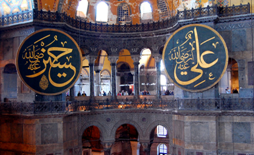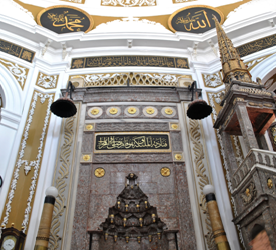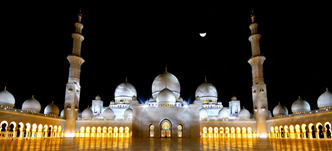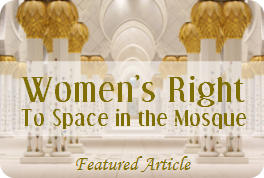


Writing Names alongside Allah's Name in Mosques
Mosques are places where Allah is to be served alone. The Arabic for "Mosque", "Masjid", used also in the Qur'an, literally means "a place of prostration", or rather "a place of prayer / i.e. salah". Regarding Masjids, Allah states the following:
وَأَنَّ الْمَسَــــاجِدَ لِلَّهِ فَلا تَدْعُوا مَعَ اللَّهِ أَحَدًا
"And the places of worship (Masjids/Mosques) are for Allah (alone): So do not invoke anyone beside Allah (in them)." (Qur'an 72:18)
In the Arabic of the above verse, مَعَ اللَّهِ أَحَدًا, used to mean 'anyone with Allah" - the word أَحَدًا, infers any single being besides Allah - whether it be a hand crafted idol, the sun or moon, a man, a saint or even a prophet. It isolates any being besides Allah. Thus, Allah teaches us that Masjids, and prayer are to be dedicated wholly to Allah without commemoration of other beings alongside Him.

It makes sense therefore that Masjids, in their interior or exterior decoration should not associate anyone alongside Allah in depicting the purpose of the Mosque. This is in-line with the above verse as well as the whole Qur'an in general. It is because Allah, in all His majesty, glory, and infinite power, cannot stand or be comparable with anything He has ever created, including saints and prophets, or other men people have come to consider holy in the past.

In this Mosque, the name "Ali" and "Allah" are both found together - along with the names "Abu Bakr", "Umar" and "Uthman" (not shown in this picture).
It is true that worshippers may not be directly worshipping the names of people decorated inside such a Mosque. However, It does highlight an issue at a deeper level. It may be resembling the kind of devotion people feel towards created beings. Sometimes it reaches to such a high level, that the emotions they feel towards these people become comparable with the emotions they should feel towards Allah alone - their Creator and Sustainer. It is precisely this mental attitude that leads people to depict their state of mind in the decoration of Mosques when building them, when Mosques are according to the Qur'an, are for people to give Allah His true measure and remember only Him in them.

"Among people, there are those who take to worship others beside Allah, loving them as they should love Allah, but the (true) believers have greater love for Allah". (Qur'an 2:165)
Therefore Quranically, writing peoples names alongside Allah's inside Mosques is not indicative of a monotheistic mentality of a true believer. This includes caliphs or a prophets' names - the objective of these people was only to establish this principle of serving Allah alone - not to magnify themselves. Therefore, no prophet would approve of hanging his name in the Mosques of Allah which would depict his status alongside Allah's:

On top of this "minbar" of a Mosque (an area where the imam leads the congregational prayers), the Prophet Muhammad's name (left) is depicted next to Allah's (right) - May Allah be glorified alone. No prophet would approve of hanging his name next to Allah's, particularly in a place where such a decoration is meant to depict the purpose of the actions of worship performed there.
"It is not fitting for any person to whom Allah gives the Book, wisdom and prophethood, that he should say to people: 'Be servants to me rather than Allah!', rather he would say: 'Be devotees (of Allah) for what you have learnt and studied from the Book'." (Qur'an 3:79)
Today, people generally understand the concept of not having idols or pictures of people in Mosques 'in case worshippers commit 'idolatry' over time'. This is a correct concept. But idolatry is a state of mind, just as Allah teaches in the Qur'an. When doing prostration in salah, one may have many household and daily objects around and in front of him or her. So long as the person's intention is to worship Allah alone, those objects do not become deities. However, a written name inside a Mosque alongside Allah, carries a more metaphysical meaning and depicts a state of mind - even though they are not items directly prostrated to. Therefore, such depictions are of greater concern as it shows the condition of today's worshippers' minds. It is therefore possible that the conditions for idolatry are already met in Allah's sight even while they remain passionate about not having images of living beings.
وَأَقِيمُوا وُجُوهَكُمْ عِنْدَ كُلِّ مَسْجِدٍ وَادْعُوهُ مُخْلِصِينَ لَهُ الدِّينَ كَمَا بَدَأَكُمْ تَعُودُونَ
"Set your faces upright at every Masjid / Mosque and call upon Him (only), making religion purely for Him. He brought you into being, such will be the return." (Qur'an 7:29)
It is very important that the intention of those people who design and maintain Mosques come from the heart of a true believer. Such people must firstly hold Allah at His worthy highest level, measure Him by His truest measure and secondly, they do not hold anyone else in the same affection and glory they hold Allah in. These believers are those who will maintain the Mosques in a way that depicts devotion to Allah alone:

"The mosques of Allah shall be maintained by those who believe in Allah and the Last Day, establish regular prayers, and practise regular charity, and hold none but Allah in awe. It is they who are expected to be on true guidance." (Qur'an 9:18)
In conclusion, it is Quranically incorrect to decorate a Mosque which is intended for serving Allah alone, with names of other beings alongside Allah. They should be decorated appropriately, resembling the goal of the Mosque described in verse 72:18, "The places of worship are for Allah (alone): So do not invoke anyone beside Allah", and the monotheistic minds of the believers described in the Qur'an.
"Those who deliver Allah's message and hold Allah in awe, and hold no one other than Allah in awe. Allah is sufficient as a Reckoner". (Qur'an 33:39)
A frequently asked question
Is it wrong to display the shahaada: 'There is no god but Allah, and Muhammad is the messenger of Allah' inside a Mosque ?
Since the shahaada is a sentence written as a statement, and the statement is a factual sentence, it is not the same as other decorations where the prophet's name is displayed next to Allah's, or displayed as a stand-alone item which can suggest the prophet ranks with Allah or hold value in remembrance comparable with Allah. The sentence reaffirms a fact that Muhammad is indeed the messenger of Allah. It can be perceived as any other factual statement, just like if one said "the sky is blue". Therefore, it does not appear to be problematic to have the prophet's name in this context.
Yet, on the other hand, it may feel pristine and absolutely monotheistic to not have anyone's name in any context on the walls of a Mosque.
Also, the purpose of all messengers was to preach the same thing - oneness of Allah. And the prophet's message was one and the same. The goal and purpose of establishments of worship is universal since the beginning of time. A mosque is not a new concept that started with Prophet Muhammad. Although there is nothing wrong with displaying the shahaada, it is noteworthy that the Prophet Muhammad was not the only Messenger, so was Jesus, Moses etc. therefore there may be limit to the wisdom of declaring only Prophet Muhammad as the messenger or element of 'overemphasis' on a certain messenger.
On the other hand, the 'full shahaada' carries a plus side as well, such as reaffirming to visitors that this place of worship believes in the guidance sent down to Muhammad rather than being any arbitrary place of worship belonging to other creeds that also believe in monotheism, but rejects the final prophet and the Scripture.
To conclude, there are few things to consider in answering this question, but there appears to be no hindering concern in declaring a factual statement.
See also:
|
"We have sent it down as an Arabic Qur'an so you people may understand" (12:2) |

Copyright © , QuranicPath. All Rights Reserved.

